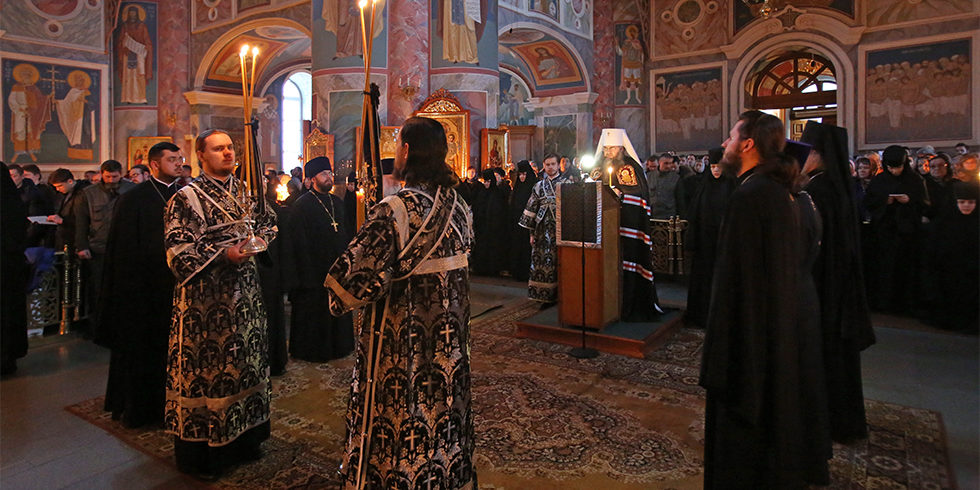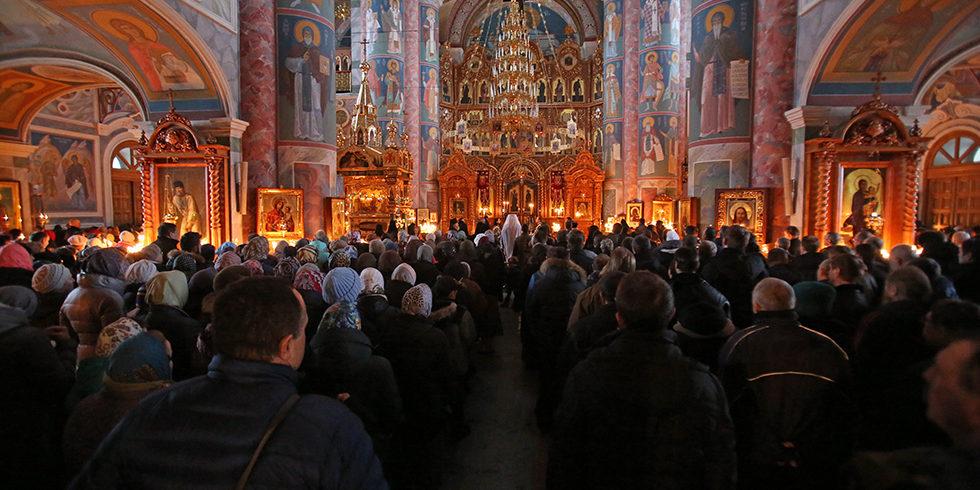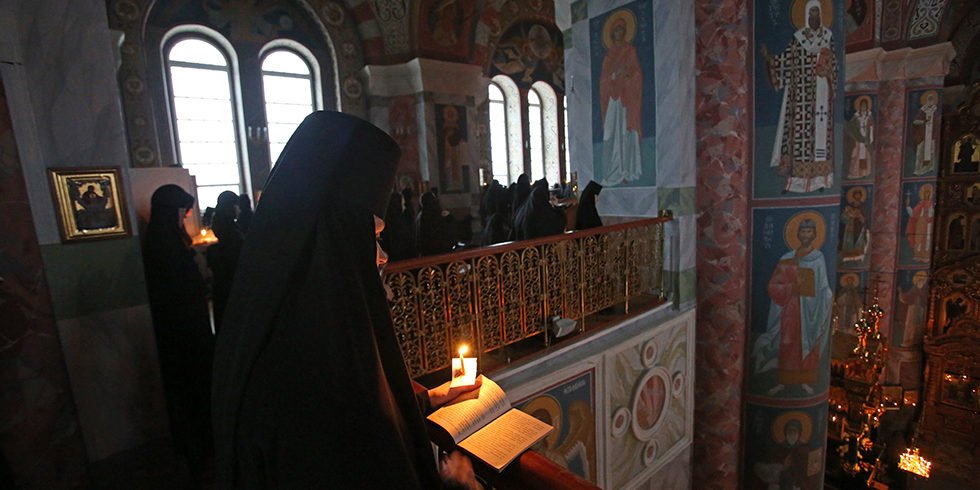- News
- The Holy Church had entered the period of Holy Forty Day Fast. We fast and commit to eat less, stay vigilant, attend lengthy Lenten services, make prostrations and increase prayers at home. We approach Lenten season with the hope of cleansing our conscience and receiving forgiveness. It became an annual tradition that Metropolitan of Nizhny Novgorod and Arzamas Georgiy would lead the Diveyevo’s monastic community into the first week of Great Lent. At 6 am, the first Lenten service began with Midnight office held at Trinity Cathedral. In accordance with the Typicon, Matins with Hours and Vespers followed. The Lenten chants transitioned to readings, while infrequent priest’s prayerful exclamations accentuated the unique and quiet solemnity of these services. Once Vespers service was over, Litya for the departed was served and Metropolitan Georgiy, on bent knees, read “Prayers for the beginning of Great Lent” as set forth in the Book of Needs. In the first prayer, the faithful invoked the Savior to have fasting without sin, fulfill His commandments, stay diligent in prayer and please Him by living virtuously. After the service, the faithful followed the Metropolitan and Mother Hegumenia in their walk along the Holy Kanavka. The first day of Great Lent is called “Clean Monday.” The first daily reading from the Old Testament’s Book of Prophet Isaiah tells of the need to attain spiritual purity: “Wash yourselves, make yourselves clean; put away the evil of your doings from before My eyes. Cease to do evil, learn to do good; seek justice, rebuke the oppressor; defend the fatherless, plead for the widow. “Come now, and let us reason together,” says the Lord, “Though your sins are like scarlet, they shall be as white as snow; though they are red like crimson, they shall be as wool.” (Isaiah 1:1-20)







The Holy Church had entered the period of Holy Forty Day Fast. We fast and commit to eat less, stay vigilant, attend lengthy Lenten services, make prostrations and increase prayers at home. We approach Lenten season with the hope of cleansing our conscience and receiving forgiveness. It became an annual tradition that Metropolitan of Nizhny Novgorod and Arzamas Georgiy would lead the Diveyevo’s monastic community into the first week of Great Lent. At 6 am, the first Lenten service began with Midnight office held at Trinity Cathedral. In accordance with the Typicon, Matins with Hours and Vespers followed. The Lenten chants transitioned to readings, while infrequent priest’s prayerful exclamations accentuated the unique and quiet solemnity of these services. Once Vespers service was over, Litya for the departed was served and Metropolitan Georgiy, on bent knees, read “Prayers for the beginning of Great Lent” as set forth in the Book of Needs. In the first prayer, the faithful invoked the Savior to have fasting without sin, fulfill His commandments, stay diligent in prayer and please Him by living virtuously. After the service, the faithful followed the Metropolitan and Mother Hegumenia in their walk along the Holy Kanavka. The first day of Great Lent is called “Clean Monday.” The first daily reading from the Old Testament’s Book of Prophet Isaiah tells of the need to attain spiritual purity: “Wash yourselves, make yourselves clean; put away the evil of your doings from before My eyes. Cease to do evil, learn to do good; seek justice, rebuke the oppressor; defend the fatherless, plead for the widow. “Come now, and let us reason together,” says the Lord, “Though your sins are like scarlet, they shall be as white as snow; though they are red like crimson, they shall be as wool.” (Isaiah 1:1-20)
Tonight, at the Great Compline service, Metropolitan of Nizhny Novgorod and Arzamas Georgiy commenced the readings of the Great Canon of St. Andrew of Crete.
The Canon presents a great number of examples from the Old Testament. Through them, the Holy Church appeals to imitate the righteous and the pious men avoiding the wicked and godless examples.
“Take my heavy and sinful burden away from me,” “Take pity on Thy creature,” “Spare me who is corrupt…” These are the exhortations of the penitent from the Great Canon’s Troparia.
We, the faithful, follow the choir repeating unceasingly: “Have mercy on me, o God, have mercy on me!” We believe that our prayer will be heard for “God Is with us.” This particular refrain “God Is with us,” sung at the Compline services during Lent, gave them its Greek name “mephimons” (Gr. μεθ ήμών) or “with us.”


